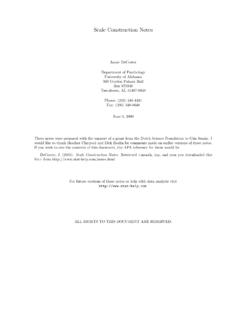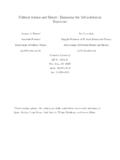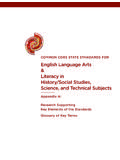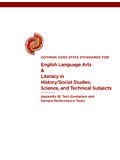Transcription of POLITICIANS, SCANDALS, AND TRUST IN …
1 politicians , SCANDALS, AND TRUST INGOVERNMENTS haun Bowler and Jeffrey A. KarpIn this paper we examine the role that political scandals play in eroding regard forgovernment and political institutions in general. We know that scandals can lowerregard for individual politicians and government leaders. Yet, less is known about howscandal influences attitudes toward institutions and the political process. It has beenwidely assumed that such attitudes are influenced by factors that lie largely beyond thecontrol of individual politicians . Using data from the and the we show thatscandals involving legislators can have a negative influence on their constituent sattitudes toward institutions and the political process. One consequence of this findingis that, instead of looking for scapegoats in Hollywood or among the failings of votersthemselves, politicians should first get their own House in words: scandal ; discontent; political attitudes; Congress; British this paper we examine the role that political scandals play in erodingattitudes about government and political institutions in general.
2 We know thatscandals lower regard for individual politicians and government leaders ( , Clarke et al., 1998; Lanoue and Headrick, 1994) and a series of recentstudies have shown electoral consequences in a variety of cases ( , Banducciand Karp, 1994; Cowley, 2002; Farrell et al., 1998; Hetherington, 1999;McAllister, 2000). We argue that the effect does not stop with popularity buthas wider consequences for the public s view of politics and political institu-tions. While a great deal of research has focused on the causes of highShaun Bowler, Department of political Science, UC Riverside, Riverside, CA Jeffrey A. Karp, Department of political Science, 113 Holden Hall,Texas Tech University, Lubbock, Texas 79409-1015 Behavior, Vol.
3 26, No. 3, September 2004 ( 2004)2710190-9320/04/0900-0271/0 2004 Springer Science+Business Media, , very few researchers have examined whether scandalous behavior onthe part of politicians and government officials influences how citizens viewgovernment and institutions (for an exception see Miller, 1999). In part thisoversight is due to the assumption that citizens evaluations of government andinstitutions are unrelated to their views of incumbent behavior and policy (seeEaston, 1965; Citrin, 1974). We contend that citizens attitudes toward politicalinstitutions may be influenced by the behavior of politicians . If so, then thescandalous behavior of politicians themselves may be partly to blame for thelow levels of political support observed in recent begin by reviewing the various theories used to explain discontent andoutline our general argument for how political scandal may influence regardfor political institutions more generally.
4 We then present evidence in supportof this argument using the example of the impact of the check-writing scandalson evaluations of Congress in the 1990 s. In order to show that our argumentcan apply more generally and is not restricted to the particular case of the we then move on to develop and estimate broadly similar models ofpopular opinion towards the British Parliament. The results of these modelsare consistent with our findings in the and suggest that our argument isnot, therefore, restricted to the AND SPECIFIC SUPPORT FOR political INSTITUTIONSIn recent years a great deal of attention has been paid to the topic ofpolitical discontent (see for example, Kaase and Newton 1995; Klingemannand Fuchs, 1995; McAllister 2000; Norris 1999) and a particular concern hasbeen the declining TRUST in government in recent years (see Dalton, 2002,pp.)
5 235 258). To some extent, of course, the decline is relative to thestarting point of the data record. Without appropriate data from the 1930 sand 1940 s we cannot really tell whether the 1950s and 1960s were unusuallyhigh and measures of TRUST in government are simply returning to theirnormal levels or not. Nevertheless, the lack of TRUST in government hasgenerated concerns and a search for explanation. Potential explanations haveranged quite widely but all refer to a common conceptual heritage derivingfrom Easton s distinction between diffuse and specific support (Easton,1965, 1975). Diffuse support constitutes a reservoir of institutional good-will and is assumed to be distinct from specific support which refers to howcitizens view incumbents and the specific actions or decisions that are madein the institutions in which they reside.
6 This overall conception has beenwidely used, for example, to explain attitudes toward judicial institutionsmost notably in the works of Caldeira and Gibson (Caldeira and Gibson,1992, 1995; Gibson and Calderia, 1992, 1995; Gibson et al., 1998). Othershave taken Easton s conceptual distinction, recognizing some amendments272 BOWLER AND KARPand limitations along the way, as the starting point for their analysis ofpopular opinion towards elected officials (see , Craig, 1993; Hibbing andTheiss-Morse, 1995).Within this broad range of literature a number of theories have emerged inunderstanding popular opinions towards political institutions. Some, especiallywithin a comparative politics tradition, develop a sociological approach andnote the rise of a newer and more critical generation, possibly driven by adifferent set of values than previous generations (Norris, 1999).
7 More edu-cated voters and more educated electorates are becoming more discerning injudging alternative view is grounded firmly in a more cautious attitude towards thecritical abilities of voters and an awareness of the limits of voter or not voters are simply not discerning enough to be able to rea-sonably and rationally evaluate government . In this view, judgements aboutpolitics and politicians may well be driven not so much by sober assessments butby more emotional criteria. Voters may not, for example, properly understandthe role that conflict and compromise play in politics (Hibbing and Theiss-Morse, 1995). If voters do not understand politics it should come as little surpriseto find that they hold political institutions in low regard.
8 Of course, voters maynot be completely to blame, they may simply be led astray by biased or unrea-sonable media coverage ( , Owen, 1999). These kinds of explanations are, ofcourse, ones more favored by politicians . As McAllister (2000) shows, votersseem to expect more of politicians than do politicians themselves and, hence,may have unreasonably high another kind of explanation is rooted in the performance of governmentitself and, in particular, in the moral and ethical failings of government . To besure, this is not a new idea. It is one that is evidently close to the originalconception of Easton and is the basis for Miller s (1974a) article and hisdebate with Citrin (Citrin, 1974; Miller, 1974b; see also Williams, 1985).
9 Miller argued that a decline in TRUST in government was grounded in a policybased alienation. Specifically, rising discontent beginning in the mid 1960s,according to Miller (1974b, p. 970), resulted from the inability of either partyto meet policy expectations. Citrin, on the other hand, argued that the declinewas in part due to the impact of dissatisfaction with incumbents Citrin s argument that scandal could erode TRUST in governmentreceived considerable attention in the 1970s, it has not figured prominently incurrent debates where scandals, as in the popularity function literature, seemto be modeled as temporary effects specific to incumbent politicians [althoughfor a broadly similar example in the comparative literature see Anderson andTverdova, (2003) who link perceptions of corruption to system level support].
10 Indeed a common theme in the literature on the Congress is thatopinions about the institution have very little if anything to do with the actionsor behavior of individual members. Many citizens may hold the Congress in273 politicians , SCANDALS, AND TRUST IN government very low regard but they nonetheless love their congressman (Parker andDavidson, 1979; Fenno, 1975). These attitudes are reinforced by the membersthemselves who create distance between themselves and the institution whencampaigning for Congress (Fenno, 1978). Empirical analyses have also failedto find a relationship between approval of individual representatives andCongress as an institution (Hibbing and Theiss-Morse, 1995, pp. 119 120).







